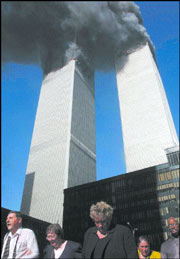NO ONE WILL FORGET where they were.
One of my first memories is waiting with my mother for my dad to take us away from Three Mile Island. We lived 10 miles from the nuclear reactor as it neared melting. I can’t remember where we were going to go, but I remember my parents’ confidence that we’d be OK, that things like this always turned out all right.
Today, nothing turned out all right. As we go to press, there’s not much more relevant information than there was this morning. We don’t know how many people died. Who killed them? Why?
Rumors are epidemic, but no one knows what will happen now. Who will we bomb? How could this happen, especially in America?
There’s no way to know. It seems impossible that hijackers managed to avert security at least four times. That the planes hit their targets. That the plan came off so “well.” That America’s luck ran out.
There’s nothing comforting to say. There’s no happy ending. Just donate blood. Hug your friends. And, hard as it is, try to remain calm. Life does and will go on.
Audrey Van Buskirk
I EMERGED FROM the subway stop at 9 this morning into a crowd gaping up at the World Trade Center moments after its top floors had burst into flames. Some people were crying, a few women crossed themselves, but mostly people were exchanging stories in that almost affable New-York-in-a-crisis way, collecting the tales that they would later tell their friends and maybe someday their grandchildren. Until the second blast. As soon as we heard the muffled boom and saw flames kick along the walls of the tower, we knew in our bellies that America was changed forever. I wanted to throw up.
A panicky mob ran screaming up the street, some stopping two blocks north to gape some more. Theories started flying: “Terrorists,” though few could say which kind for what cause. Sirens howled, and quickly the streets became eerily empty of traffic. We could see some small figures-something orange, something flapping white-hanging off the building. Could they be people? The crowd let out a high-pitched primal squeal. I got the hell out of there.
Due for jury duty at New York’s State Supreme Court on Centre Street, I headed east in a nauseous daze, propelled by one of those defense-mechanism impulses that makes you focus on the thing that is absolutely beside the point. I turned onto Duane Street and soon found myself passing the Javits Federal Building. I started to run. It might blow at any minute, I thought.
I spent much of this August in Israel and the occupied territories. I was there when the Sbarro pizza restaurant in Jerusalem was blown up by a suicide bomber and left Haifa only a day before the bombing of a restaurant there. Though I witnessed during my travels through the West Bank and Gaza how those areas were the ones literally under siege, I began to understand the depth of Israeli fear. I lived in perpetual anxiety: sitting in a cafe, going to the grocery store, standing in any crowded area. Every time I boarded a bus, I felt my heartbeat speed up. I never felt so relieved to return home from abroad as I did two weeks ago. At last I could drop my guard, leave the panic behind.
Or so I thought. Jury duty was over; the court was closing. So I began the citizens’ march up Centre Street, merging with the throngs sent home. Cops waved us away from subway entrances and told us to keep walking.
I fell in with a group of young women, administrative assistants at 2 World Trade Center. One was still crying. She was about to enter the World Trade Center when the first plane hit. “Arms, legs. Parts of people. They were falling on my head,” she said. Her friend put an arm around her, saying only, “Shhh,” and the whole block went silent for a moment. The third friend tried frantically to get a cell phone signal. A secretary to three vice presidents at a Wall Street firm that opens at 9, she typically starts work at 8:30. “I have to get their days prepared,” she said, shaken yet proud, almost as if she expected to be there again tomorrow. “My subway was late today, and for some reason, for once, as the train slowed down and waited, I didn’t get mad,” she marveled.
Her cell phone calls wouldn’t go through. Neither would anyone else’s—block-long lines formed at pay phones as WTC workers tried to contact loved ones to let them know they were OK.
As we trudged along—strangers talking like old friends, people who managed to find cabs offering to share them—I flashed on the grammar school drills I went through in the ’60s. The Cold War came to my Midwestern suburban school in the form of duck-and-cover exercises and, once a year, a practice evacuation. We were let out of school early and had to walk all the way home, filing out in neat lines and heading into the streets, kids peeling off as we came to their neighborhoods.
A real war has come to these shores now, bringing massive violence into America. The terrible human casualties of today’s attacks haven’t even begun to be counted yet; some of the intangible ones to come are obvious—the First Amendment, for starters. The altered city skyline is only the most visible manifestation of the size of the change.
I finally got my turn at the phone. There were three anxious messages on my answering machine. One from my partner. And two from friends in Israel.
Alisa Solomon is a staff writer at The Village Voice.




